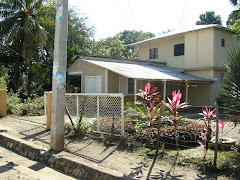Little to report....
Since my trip to Rotterdam on Wednesday, not very much has happened that seems especially noteworthy.
On the other hand, anybody who likes to write should be able to describe the smallest, most unimportant occurence or thing in an entertaining matter, right?
Not that I can think of a certain one of these occurences or things to write about.
Dutch class is back on, which means we're back in the grind, which means I'm back to being annoyed about having to take a beginning language class. I won't bore you with what you already know, but I just have to once again open up the subject of the way languages are taught.
It seems so strange to me that there is a "normal, given" way of teaching languages, at least in "the West" (that term is incredibly useful in Human geography, but I never understand why, when every other term must have it's definition defined and redefined, but this one passes as an easy way to separate people and cultures and societies and all those other words which are picked to death - but I'm getting off topic), and that that way is this one. It must be obvious to anyone who has ever spent time around babies that people do not naturally learn languages by memorizing phrases and the fill in the blank answers that go with them. (In this case, that would be "Hoe heet je?" "Ik heet _____.") Surely this is not something that only people who study linguistics and/or learn a language by immersion realize.
When I learned Spanish in the Dominican Republic, I had a whole week after I arrived before I started working at the politecnico. I spent a bit of time each morning studying Spanish, and the things I chose to study were the things that seemed most important to know. I studied irregular verbs, but the first words I learned were not "household chores" or "how to ask for directions" (which is an absolutely ridiculous notion, I think. Everyone knows that if you are lost and don't speak the language, you just ask people and follow the directions their fingers point in, and keep asking until you arrive). In fact, I think the first two words I learned in the Dominican Republic were colmado, which is the name for the little corner stores in the DR, and subir, which means to go up. That's because my bedroom was upstairs, and each night when I was going to bed, my host mom asked if I was going up, as in going to sleep. Voy a subir came to mean I'm going to bed, not just I'm going upstairs.
The first thing I learned in France, similarly, was not gas station terminology (something I distinctly remember the French 5-6 class learning the year after my exchange). I finished breakfast my first morning, and in an attempt to say "I'm finished," I said je fin. I doubted this was the correct tense, but I knew that je means "I" and that fin is what they say instead of "The End" in the movies.
But when I said "Je fin," my host mom laughed and explained that I had just said je faim, meaning "I hunger".
Not that this proves anything I am saying.
This is why I hate prescribed sentences: If, in Dutch, someone says "Hoe heet je" or "wie ben je", it means essentially the same thing. But if you reply to the first "Ik ben Grace" or the second "Ik heet Grace", you are answering incorrectly. If you are left to simply understand the general meaning of the sentence, you can answer correctly: "Grace, en jij?" If you learn the building blocks of the language, you will know which verb to choose because you can distinguish between their meanings. If you learn simply that one means "What is your name" and the other means "who are you", the meanings will become mixed in your mind and you don't care which is being asked because they mean the same thing.
Basically.
I also hate learning how to ask for directions. That is not useful information to me. I live in Middelburg and have for over 5 months now; it is unlikely that I will get lost here. What I do want to know is how to ask "how late are you open?" and, more important, how to understand the answer!
In psycholinguistics right now, we are learning about lemmas and traces and deep structures and complicated things like that. It is all very interesting and not quite too scientific for me; the subject (and teacher) are interesting enough for me to follow. But it adds to my frustration with ACC 099 Beginner Dutch. Obviously this is not how my brain picks things up.
Maybe I should become a ground-breaking, innovative, foreign language curriculum and textbook writer.
That actually doesn't sound too boring. (Well, maybe the textbook part.)
I am 30 pages away from finishing Northanger Abbey, and I can't remember the last time I read a book this quickly. I've decided that next will be "Long Ago in France", but maybe it would be better to put that off until April and focus on studying for midterms, which are two weeks away.
However, I need something to read before sleep each night. Although I suppose reviewing psycho- and sociolinguistic notes might do...
Subscribe to:
Post Comments (Atom)





3 comments:
Hmm, interesting. I can't think how it is I pick up languages. I guess at least in the case of Dutch it's by picking up phrases, not words or sentences. Hoe gaat het and ik heb geen idee and een pils alstublief and hoe kom ik naar... stuff like that.
But your comments on subir ... that makes me think well, what I'd have done in that case is probably gone to the dictionary at some point to see what subir means, to see whether it was some kind of locally idiomatic usage or "correct Spanish." Why? Because the word lookslike it should have something to do with "down," not "up." That's what language study has done to me. It's always distracting me from the thing at hand.
So I look it up, and discover yes that's perfectly correct, "subir" means "to go up." What means "to go down?"
Hmm, interesting. I can't think how it is I pick up languages. I guess at least in the case of Dutch it's by picking up phrases, not words or sentences. Hoe gaat het and ik heb geen idee and een pils alstublief and hoe kom ik naar... stuff like that.
But your comments on subir ... that makes me think well, what I'd have done in that case is probably gone to the dictionary at some point to see what subir means, to see whether it was some kind of locally idiomatic usage or "correct Spanish." Why? Because the word lookslike it should have something to do with "down," not "up." That's what language study has done to me. It's always distracting me from the thing at hand.
So I look it up, and discover yes that's perfectly correct, "subir" means "to go up." What means "to go down?"
bajar or bajir means "to go down"... I think bajar. But that's funny, I never noticed that about "subir". Now that you point it out, however, it seems very obvious... I think you will agree with me, though, that "bajar" is a very logical word for it's meaning.
Post a Comment